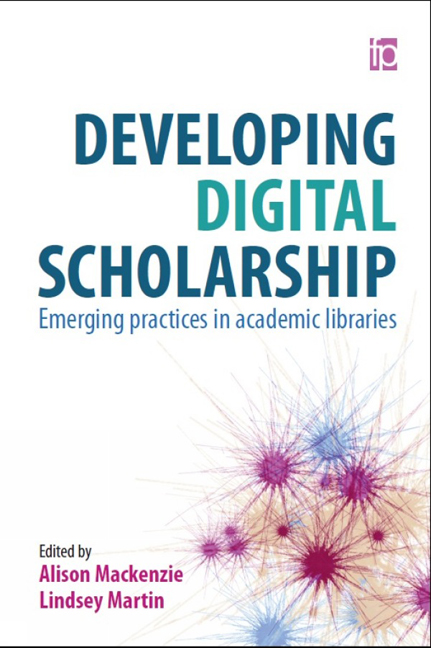Book contents
- Frontmatter
- Contents
- List of figures, tables and case studies
- Editors and contributors
- Introduction
- PART 1 A review of the landscape
- PART 2 The agile librarian
- PART 3 Digital spaces and services
- PART 4 Communications and social networking
- 8 Social networking with the scholarly community: a literature review
- 9 Developing digital scholars: from the ivory tower to the Twittersphere
- 10 Reflections on digital scholarship: so many reasons to be cheerful
- Index
9 - Developing digital scholars: from the ivory tower to the Twittersphere
from PART 4 - Communications and social networking
Published online by Cambridge University Press: 08 June 2018
- Frontmatter
- Contents
- List of figures, tables and case studies
- Editors and contributors
- Introduction
- PART 1 A review of the landscape
- PART 2 The agile librarian
- PART 3 Digital spaces and services
- PART 4 Communications and social networking
- 8 Social networking with the scholarly community: a literature review
- 9 Developing digital scholars: from the ivory tower to the Twittersphere
- 10 Reflections on digital scholarship: so many reasons to be cheerful
- Index
Summary
Introduction
Who or what is a digital scholar? Questions such as this are often surprisingly absent from library literature, either being side-lined in our rush to establish a digital scholarship centre or neglected in our push to capitalize upon interest in open access (OA) publishing and, more recently, open educational resources (OER). Yet, while the establishment of physical and financial backing for these efforts is vitally important, our disregard for the underlying (and occasionally contentious) scholarly practices and activities that support these goals is troublesome. Just as we saw with Web 2.0 hype back in the early 2000s, a focus on the shiny new technologies rather than on the practices and individual capacities needed to engage within these new environments runs the risk of reducing digital scholarship to a technical or instrumental skill set and neglecting the broader sociocultural issues that are at play within this arena, including questions about the nature and purpose of scholarship in an era of increased accountability, impact and control. The focus on the tools rather than the people also constitutes a missed opportunity for librarians.
This chapter will explore our changing understandings of digital and open scholarship as well as the librarian's role in supporting the development of the capacities that are needed to engage within these environments. Defining a digital scholar as ‘someone who employs digital, networked and open approaches to demonstrate specialism in a field’ (Weller, 2011, 5), and digital scholarship as comprising three major forms: open education, open access and networked participation (Veletsianos and Kimmons, 2012a, 168), the chapter will be split into three sections. The first section will start by exploring the concept of digital scholarship, drawing out the connections between digital, networked, participatory and open scholarship. The chapter will then focus more concretely on the idea of networked participation, or the use of online social networks to ‘share, reflect upon, critique, improve, validate, and … develop … scholarship’ (Veletsianos and Kimmons, 2012a, 168), paying particular attention to how changing ideas of academic influence, reputation and identity intersect with the realities of contemporary academia. Finally, the third section of the chapter will use a series of practical examples to explore how librarians can use these ideas to facilitate researcher learning and development as well as further discussion in the field.
- Type
- Chapter
- Information
- Developing Digital ScholarshipEmerging practices in academic libraries, pp. 157 - 172Publisher: FacetPrint publication year: 2016



